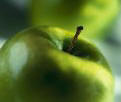|
A: Yes. A study published in June 2004 in
Food and
Chemical Toxicology tested oral toxicity of
apple polyphenol extracts at
levels 200 times the recommended dosage for humans. Researchers reported "no
significant hematological, clinical, chemical, histopathological, or urinary
effects" even at these extreme dosages.
Apple polyphenol extracts are listed (as "apple essence,
natural") in the FDA's approved additive/GRAS (Generally Recognized As Safe)
database.
|
|
A: It would be great if we could all get plenty of
concentrated polyphenols from diet alone, but most research indicates most
dietary polyphenols are poorly absorbed. In 1997, researchers is the
Netherlands reported that "flavonoids (polyphenolic compounds) present in
foods were considered non-absorbable because they are
bound to sugars."
A study at the Linus Pauling Institute concluded that
"despite the high antioxidant capacity of individual
apple polyphenols
and apple extracts
and the significant antioxidant effects of
apple extract added to
human plasma in vitro, ingestion of
large amounts of apples by humans does not appear to result in
equivalent in vivo antioxidant effects of
apple
polyphenols."
| Many of the studies on the health benefits of apples are actually
testing potent apple
polyphenol extracts, not whole apples.
Apple polyphenol extracts
are highly bioavailable and water-soluble. |
You can increase your intake of
apple
polyphenols by eating fresh apples (including the skin, where the highest
concentrations are found), but unless you have your own apple trees, there
is no guarantee that your fruit contains enough
apple polyphenols.
Worse, the apples at your grocery store are not
fresh, and may have lost most of their
polyphenol
content before you buy them. All commercial apples in the U.S. are
cold-stored in warehouses, most for many months.
A study on apples published in 2004
found that "total phenolics and total
antioxidant activity" decreased in the first three months of cold storage,
and that "cold storage rapidly impoverishes
these properties in skin." The same study reported "strong,
time-related decreases over 6 mo of cold storage..."
Most commercial apple
products contain little or no polyphenols due to processing.
Polyphenol content
also varies greatly between apple varieties
and fruit maturity. Relatively higher concentrations have been found in
Granny Smith, Red Delicious, Rome Beauty,
and Idared varieties.
Japanese researchers report that immature apples, which
are too bitter to eat, contain 10 times more
apple polyphenols than
mature apples. These immature apples are used to produce the
high-concentrate apple polyphenol extracts.
Surely, there is some benefit in increasing dietary intake of
apples. There are serious questions, however, as to whether eating whole,
cold-stored
apples will substantially increase your absorption of these valuable
polyphenols.
Many of the studies on the health benefits of
apples are actually
using potent apple
polyphenol extracts, not apples, in those studies.
The use of standardized
apple polyphenol extracts
makes sense in terms of laboratory testing, but using the
apple polyphenol
extracts may also make sense for people wanting to realize the
reported health benefits, for the following reasons:
-
Apple extracts
are the actual compounds showing the results in many of the available
medical studies.
-
The
polyphenol
bioavailability of
apple peel powder extracts
is far higher than from whole apples, which must be digested to extract
the phytochemicals.
-
The concentration of
polyphenols in
apple peel
extracts makes it possible to consume higher doses. (Many studies
you will read report dose-dependent effects, with higher dosages providing
greater benefits.)
|
|
|
A: Apple polyphenol extracts are currently used commercially in
health supplements, chewing gum, breath strips,
toothpaste, herbal teas, energy drinks and cosmetics. Most of these products
are only available to consumers in Japan.
A Japanese company, Asahi Breweries, has announced plans
to market and energy drink in the U.S. in 2005 blended with
apple polyphenol extract.
A U.S. company now has the product available in
capsule form. Please check our
suppliers page for updated product information. |
